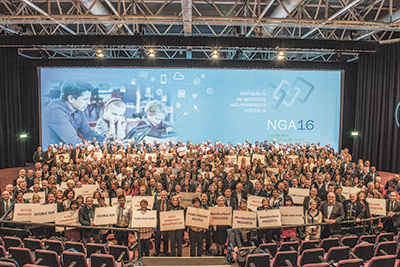The 2016 Australian Local Government Association (ALGA) National General Assembly (NGA) discussed the innovation needed to solve the problems facing Australian cities and regions.
“In case you’re not aware, we’re meeting in the middle of an election campaign,” ALGA President, Mayor Troy Pickard, informed delegates at the beginning of the conference.
It was unfortunate timing that the 19-22 June NGA coincided with the last two weeks of federal campaigning – a fact hammered home by the conspicuous absence of all major party leaders.
But this didn’t deter an estimated 700 local government delegates from attending the event at the Canberra National Convention Centre.
Journalist and political commentator George Megalogenis was charged with the opening keynote – remarking this was the most representative group of elected leaders that he had ever addressed.
In typically astute fashion, Megalogenis outlined some of the country’s key political and economic problems – namely, congestion in the cities, and atrophying population in the regions – and how we got to this point. Volatility is ‘the new normal’, he wagered.
The ongoing divide between the prosperity of cities and regions was highlighted in the 18th State of the Regions Report, which was released at the annual Regional Development Forum the day before the NGA.
Commissioned by ALGA and undertaken by National Economics, the report flagged critical issues facing regions, including poor telecommunications access and infrastructure.
Co-author of the report, economist Dr Peter Brain, said this is a concerning trend.
“What we’re seeing is that the country’s prosperity is concentrated in isolated pockets of Australia, with many regions finding it difficult to plug into this prosperity due to insufficient telecommunications and transport infrastructure.”
Increased government funding could ease inequality in regional areas, said Dr Brain.
“Modelling by National Economics shows that a program of increased local government grants would lift national income and achieve greater equality in the distribution of income and opportunity across the country, with particular benefits to the low-income, mainly rural regions.”
Mayor Pickard said ALGA is pushing the Federal Government to commit to stronger development policies for regional areas: “It’s clear from the report that a definitive and comprehensive regional development policy is now crucial with more strategic stimulus needed from the government to help boost all of Australia’s regions.”
On the other end of the spectrum, the urban population boom and infrastructure backlog was also a key point of discussion at the Assembly.
An afternoon panel on day one brought together representatives of the eight bodies that joined together in May to press the federal government for more secure infrastructure funding.
Alongside ALGA, there was representation from the Planning Institute of Australia, Logistics Council, Property Council, Urban Development Institute of Australia, National Farmer’s Federation, and Green Building Council of Australia and Institute of Public Works Engineering Australia.
Panel members came to a consensus on the need for better strategic planning and longer-term thinking on behalf of government.
Day two of the Assembly commenced with an address from the Minister for Major Projects, Territories and Local Government, the Hon Paul Fletcher MP, who discussed the Coalition’s Smart Cities Program. The proposed $50 million initiative is designed to encourage local government to join with business and the community to develop technology-based approaches to local problems.
Managing Director of Microsoft, Pip Marlow, also provided a well-received keynote, discussing how local government should strive to be a “petri dish of innovation”.
The through-line of innovation extended throughout the day – sessions covered forward-thinking approaches to the environment and climate change, business improvement and digital transformation.
International guests from the City of Boston in the U.S. were welcomed to discuss their groundbreaking urban revitalisation project.
Day three of the Assembly was opened by champion marathon runner Robert de Castella AO MBE, who spoke on the work of the Indigenous Marathon Foundation.
The Shadow Minister for Regional Development and Local Government, the Hon Julie Collins MP, rounded out the list of speakers, announcing Labor’s commitment to the restoration of indexation of Financial Assistance Grants from 2017. Ms Collins also highlighted commitments to the re-establishment of the Australian Council of Local Government (ACLG), a regional innovation fund and increased funding for women in local government.
Of the motions voted on at the Assembly, welcome news for many was the City of Darwin’s motion for local government to support marriage equality. After impassioned speakers put forth the case for both sides, the motion was passed by a majority of delegates.
As per the Assembly’s protocol, following the initial vote, the motion was forwarded to the ALGA board for consideration and has now been officially resolved.
The annual National Awards for Local Government were also held in conjunction with the Assembly. Mackay Regional Council in Queensland took home the coveted prize for National Excellence in Local Government for their Transforming a Water Business project.








